Living history: Wasserman’s Flowers & Gifts is a story about Muskegon’s past and future
The Wasserman family and their flower shop have been an integral part of Muskegon for 137 years, and the city's oldest family-owned business weaves a narrative about the history, present and future of Muskegon—about the determination, joy, hardships, and perseverance of its people.
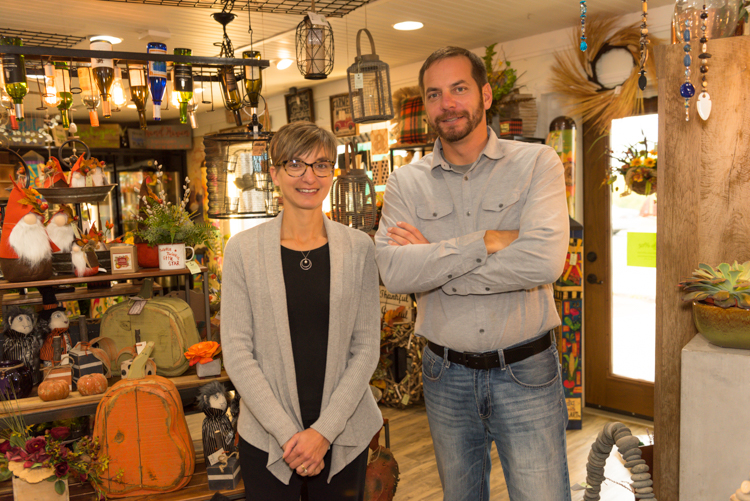
It is not easy for Angie Wasserman-Nelund and Troy Wasserman to maneuver from one side of Wasserman’s Flowers and Gifts to another. At least, it’s not easy if they want to do it quickly.
It’s noon last Friday, and Muskegon’s oldest family-owned business is packed with customers purchasing floral bouquets and wreaths radiating hues of autumn (think: bursts of the oranges, yellows and reds that now fill our trees). And everyone wants to say hello.
This, of course, is a good thing: it’s more than evident that Angie and Troy, the sister-and-brother duo who own Wasserman’s Flowers and Gifts at 1595 Lakeshore Dr., are beloved—and for good reason. The Wasserman family and their business have been an integral part of the fabric of Muskegon for 137 years, and the scene that’s playing out last week—one of hugs and greetings, of stories being shared about children and inquiries about family members—has played out, in one form or another, since Wasserman’s debut in 1880.
As with any time in the shop, Friday is about what we as people do to celebrate birthdays and weddings, the way we mourn the deaths of family and friends, the color we seek to say everything from ‘thank you’ to ‘I miss you,’ how we want our homes to be reminiscent of the changing of the seasons. All of this, all of these interactions that are happening now and have happened throughout the past 137 years, make up the narrative of a shop that is really a story about the history, present and future of Muskegon—of the determination, joy, hardships, and perseverance of its people.
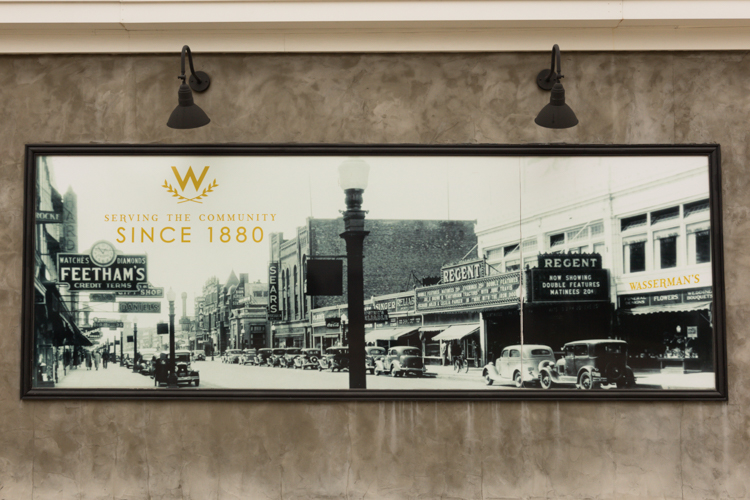
It’s a story about a German immigrant, Louis Wassermann (the second ‘n’ was dropped not long before the turn of the 20th century to “Americanize” the name, Troy explains), who came to the United States at the age of 19 in 1872 and opened Wasserman’s Flower Shop with his wife, Amelia, in 1880. It’s a story about following dreams, about the ebb and flow of the city, about making it through the Great Depression and leaving the store to fight in World War II, about moving the shop because its home on Western Avenue, where the flower store was located for 94 years, was torn down to make way for the downtown mall in the 1970s. It’s about five generations of the Wasserman family embracing the city they’ve always known as home, about them loving, supporting, and celebrating Muskegon and its residents.
“It’s amazing when I watch the History Channel or see a documentary and it shows what was happening in the country in the 1880s and 90s, and I say, ‘Oh my gosh, the flower shop was open then,’” Angie says as she sits in the store’s back room and flips through a binder teeming with the shop’s history: news clippings from decades past, black-and-white photos of relatives, obituaries of the people who once filled Wasserman’s, receipts from flowers regularly purchased by lumber barons Charles Hackley and Thomas Hume, and many more details that give a glimpse as to what 137 years means in the life of a family, a store, and a city.
“It was open through the Depression, the World Wars,” Angie says. “It’s hard to wrap your head around. Our everyday livelihood goes back that long into the history of the United States and the community. And so many things have changed. There’s a wow factor for me; that’s a lot of years.”
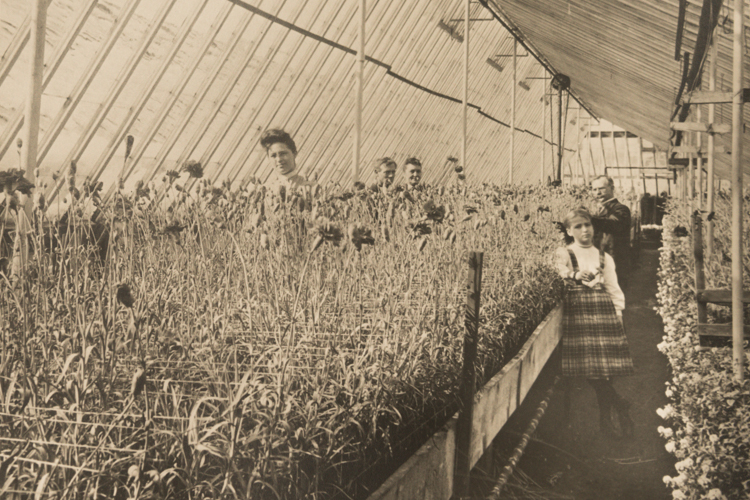
The beginning: Dreams of Louis Wasserman
Louis Wasserman was born in 1853 in Germany and was one of three million people who, prompted by low wages and a lack of employment opportunities, left the country between 1862 and 1890 in search of a better life abroad. The great-great grandfather of Angie and Troy, Louis came to the U.S. in 1872 and first settled in Milwaukee, Wisconsin, where he met and married Amelia. Together, they moved in 1874 to Muskegon, where Louis worked as a tailor while cultivating his passion during off hours: his garden. Encouraged by his wife to leave tailoring and pursue his dream of working with flowers, Louis built what’s believed to be Muskegon’s first greenhouse on the corner of Irwin Avenue and Terrace Street. As Louis grew and tended to the rows of plants, Amelia would sell the flowers that were quickly embraced by the city.
Wasserman’s makes one of its first media appearances in a Muskegon Chronicle section titled “Local Events” published on May 21, 1886. In the sea of text that were newspapers in the 1800s, the Chronicle gives a rundown of a variety of events in the city, including the funeral for five-year-old Elsa Kanitz, H.B. Smith opening a new grocery store on Jackson Street, and frustrations over a blustery day. (“The South Wind has been enjoying the fun of kicking up a dust today, but he’s the only chap that enjoys it. Pedestrians have found it extremely disagreeable going about the streets collecting sawdust and splinters in their optics,” the newspaper writes.) In the midst of these details, the newspaper describes a welcome scene at Wasserman’s.
“A large cactus plant in full bloom at Wasserman’s flower store presents a gorgeous and beautiful appearance,” the Chronicle writes in its one sentence dedicated to the store that day.
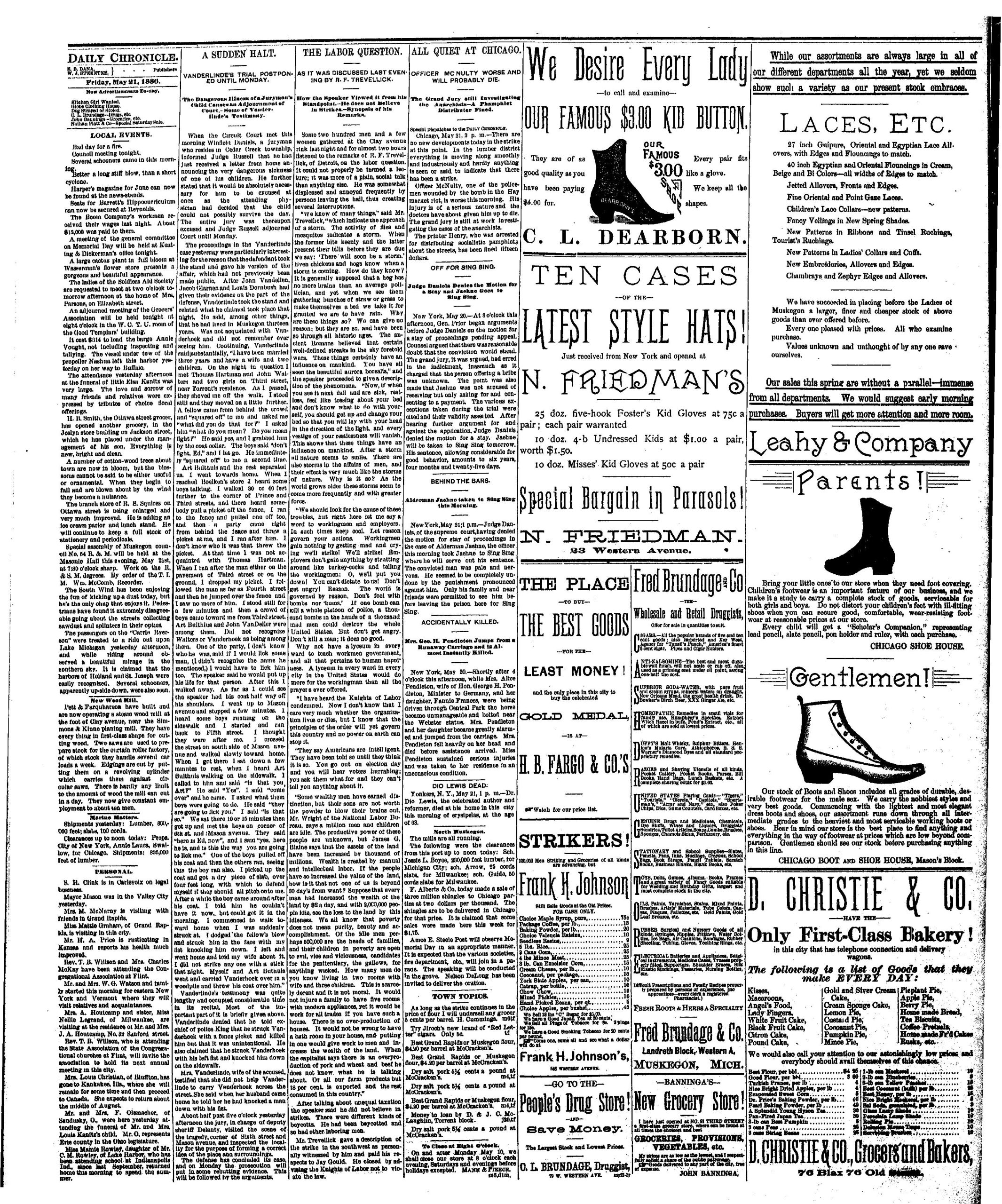
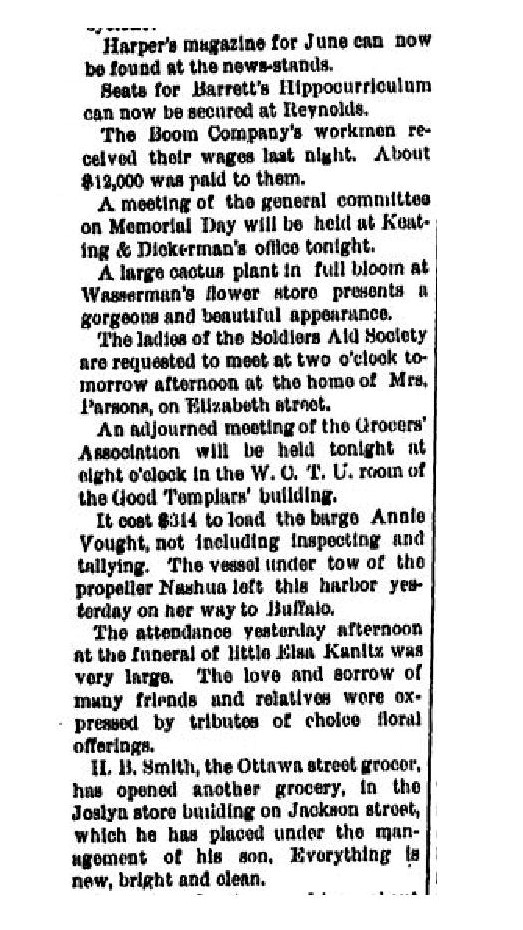
Drawing attention from Charles Hackley and Thomas Hume, Wasserman’s regularly provided flowers for the millionaires who made their fortunes on the lumber mills that once dominated the city (in the lumber industry’s heyday in the 1880s, 47 sawmills surrounded Muskegon Lake).
“We did the flowers for Hackley’s and Hume’s daughters’ weddings, as well as for the funerals for Hackley and Hume. We decorated both of the Hackley and Hume homes on a regular basis,” Angie says, pulling out a 1903 receipt for $30.90 (which, with inflation, would be about $817 now) that Charles Hackley spent on flowers, vases, and baskets.
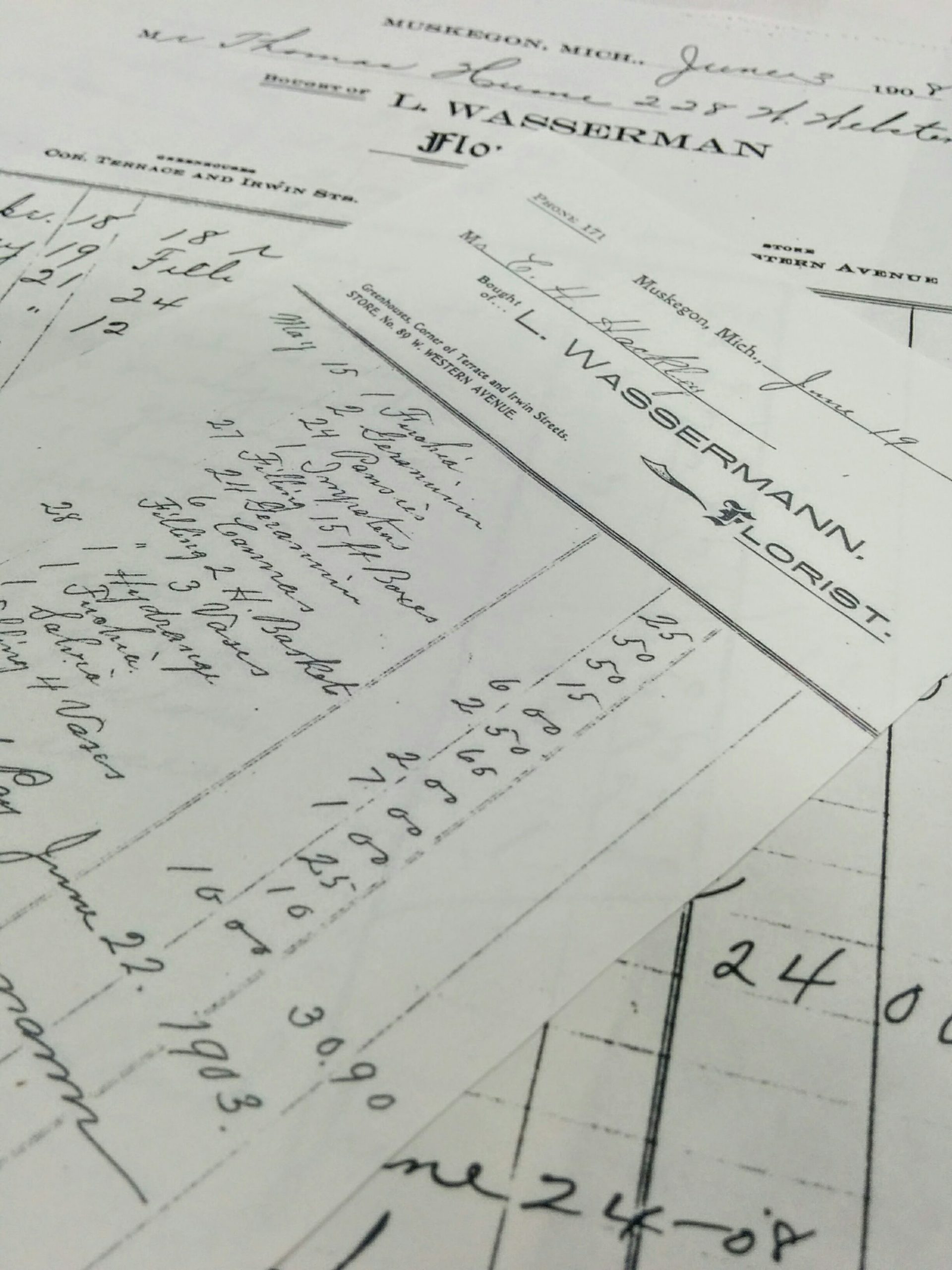
“My great-grandpa knew the Hackleys and Humes, and he said they were very nice and noted they tipped him, which was very unusual for the times,” she continues.
Beginning with the one venue at Irwin and Terrace, Wasserman’s grew to own and operate eight greenhouses by the time the business moved in 1925 to the space next to downtown’s Regent Theater, a 1,100-seat venue that opened on Western Avenue in 1916. The structure originally operated as a live theater, and, like the flower shop’s building, was demolished in the 1970s for the construction of the Muskegon Mall, a vast indoor shopping complex that covered eight downtown blocks spanning 23 acres. The flower shop also operated in another downtown storefront on Western Avenue, which they shared with a milliner, prior to its space by the Regent. Following the move to the building by the Regent, Louis and Amelia’s son, William, took ownership of the business.
Stories from that period abound, including William taking his son, also named Louis, for a drive to watch as the city celebrated the end of World War I with firecrackers and many a drink, and one of the Wasserman family’s favorite tales from that era involves a horse that wasn’t too keen on staying put.
“Because they did flower delivery by horse and carriage then, my great-grandpa bought a horse from the fire station to help. But, old wives’ tale has it that whenever the fire alarms would sound, the horse would take off,” Angie says, chuckling.
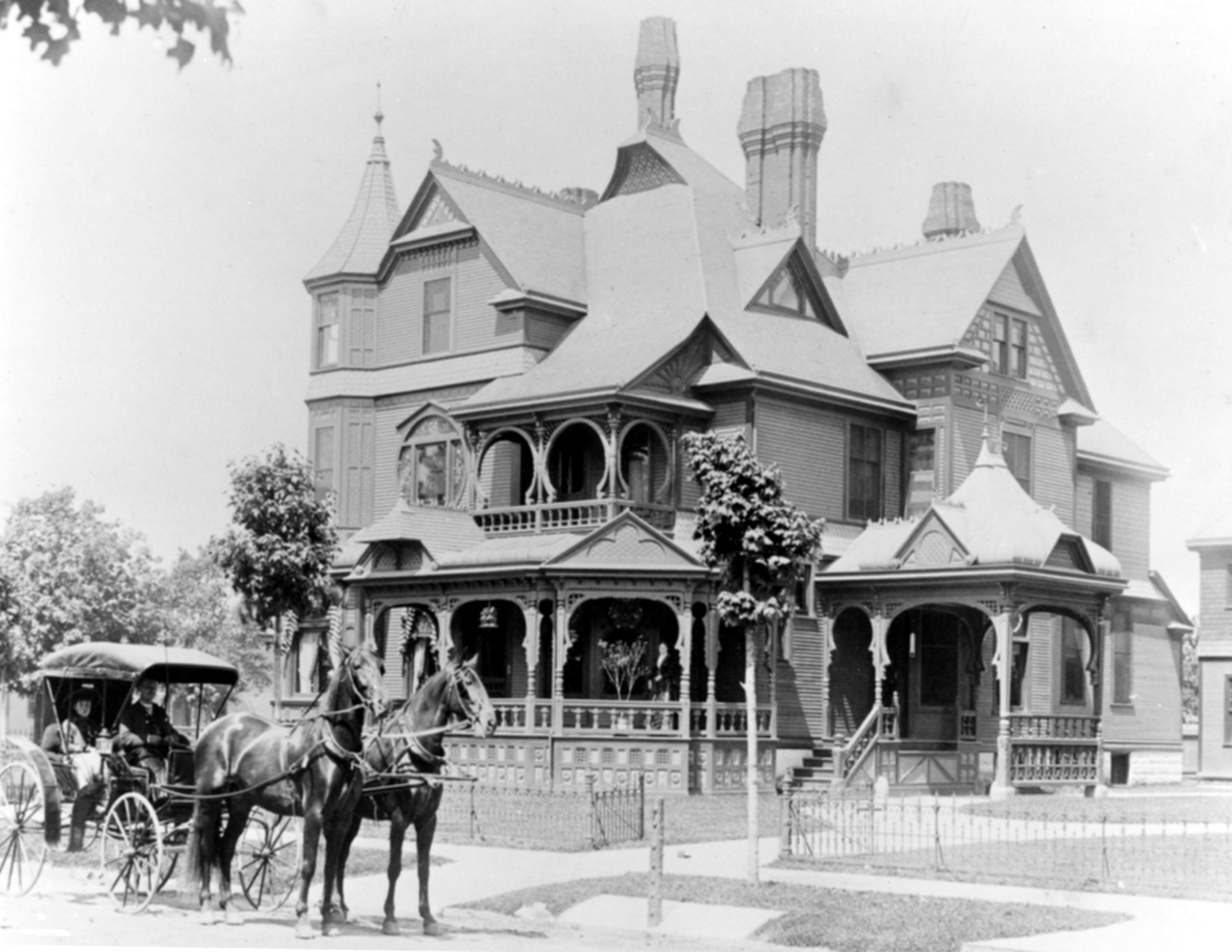
Scraping by: The hardships of the Great Depression & World War II
After the stock market crash in October 1929 and the subsequent decade-plus of economic hardship that left about a quarter of the country’s workforce unemployed, businesses in Muskegon were struggling—and Wasserman’s was no exception.
“We would’ve gone out of business without the generosity of the owner of the Regent Theater, who forgave months of rent,” Angie says of P.J. Schlossman, who owned the Western Avenue building in which Wasserman’s was located. “My grandfather, Louis, talked about how hard that time was.”
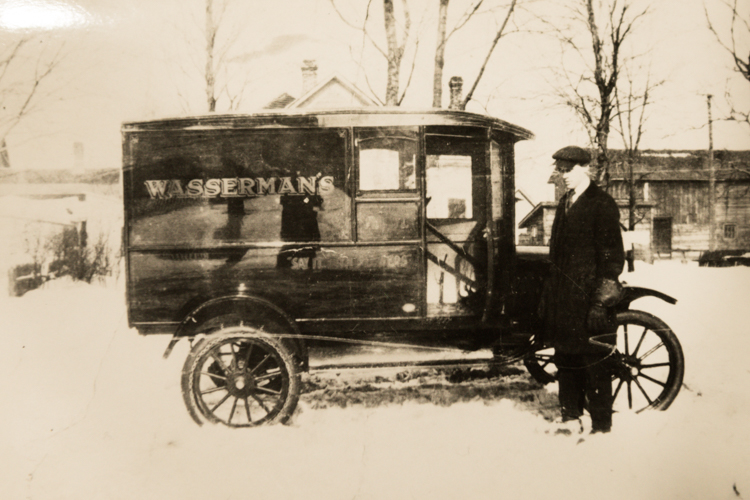
The store made it through the financial turmoil of the 1930s, and in the 1940s Louis Wasserman, the grandson of Louis and Amelia, took over the shop—but had to leave it almost immediately after doing so because he was drafted to fight in World War II.
Louis Wasserman had gone on to work at his family’s flower shop full-time after graduating from Muskegon High School in 1931. Drafted for the Army in 1942, Louis was stationed throughout Europe and participated in the D-Day invasion in Normandy, France.
“My great-grandfather had to come out of retirement to keep the store running,” Angie says. “My grandfather was in his 20s at that time, when he was drafted, but he’d talk about how he was older than most of the people he was serving with.
“After the war was over, he was stationed in Southern Michigan until his release,” she continues. “Flowers were so scarce then that whenever he could take a leave from the base, he’d stop at every greenhouse and floral supplier he could to pick up as many flowers as he could.”
Upon coming home from the war, Louis returned to his family’s flower business and married Stella Tourre in 1946. They would go on to have seven children, including Dennis, who would take over the shop in the 1970s. Known as “The Fish” because of his love for fishing, Louis was, like all of the Wassermans, deeply involved in his community. A life member of the Elks, the Eagles and the Muskegon Conservation Club, Louis was also known for his legendary fish fries and a sense of humor that seemed to keep the entire city laughing.
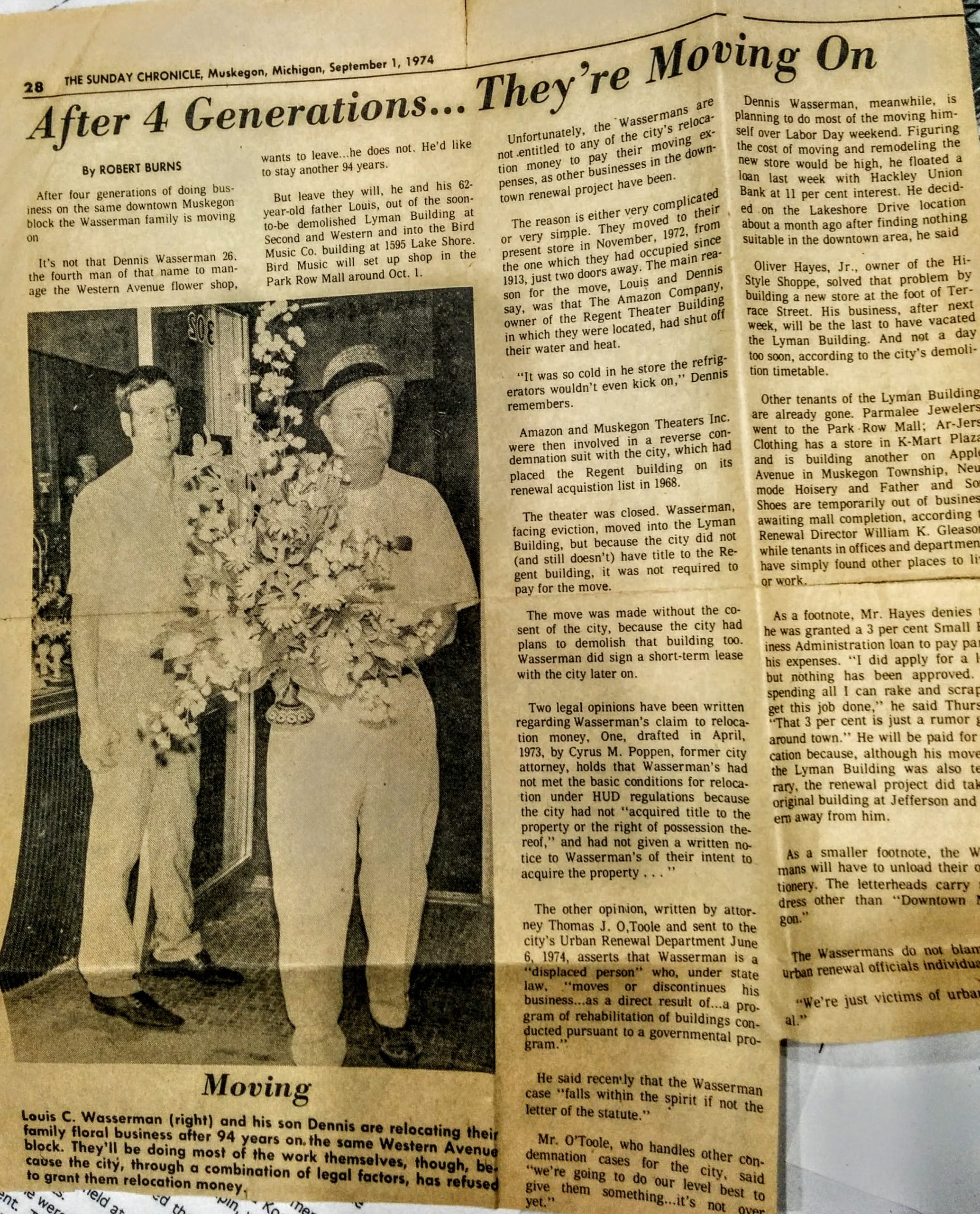
‘Urban renewal’: Downtown demolition forces Wasserman’s to move
After 94 years of operating on the same Western Avenue block, Wasserman’s was forced to move from its downtown home in the early 1970s because the shop’s building was slated to be razed for the incoming Muskegon Mall. At that time, the mall was being touted as “urban renewal,” a massive indoor commercial project that would revitalize a city economy sinking under the closures of major employers, like the Lakey Foundry and Grossman’s downtown department store. However, once the Lakes Mall opened in Fruitport Township in 2001, a number of large stores left the Muskegon Mall for the new shopping facility. Such an exodus prompted the Muskegon Mall to shutter that year, in 2001, leaving in its wake a massive vacant property and a downtown largely devoid of retail. (Now, following the investment of more than $123 million into downtown projects over the past 15 years, the area is quickly growing, with everything from mixed-use residential buildings to new commercial establishments being created.)
Like a string of other businesses, Wasserman’s packed up and left the downtown. It moved to a shop just across from Muskegon Lake at 1595 Lakeshore Dr., which had previously been a private residence and then Bird’s Music. Dennis Wasserman, Angie and Troy’s father, took ownership of the business around the time of its relocation.
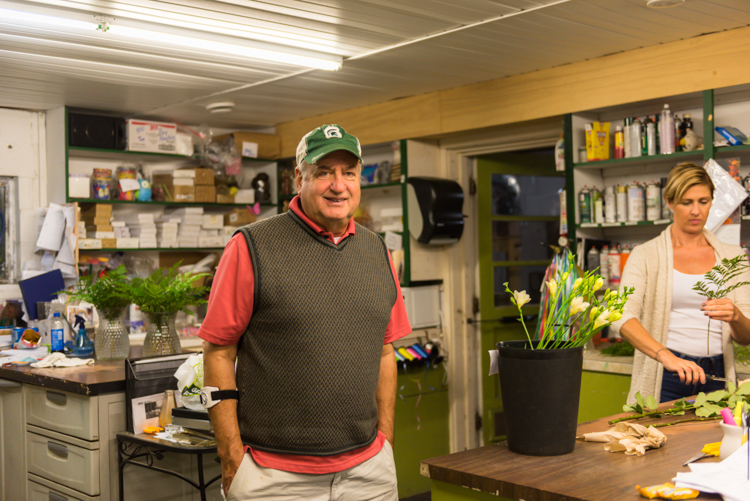
“My dad was always interested in running it,” Angie says of Dennis, who, like Angie and Troy, attended Michigan State University for its horticulture program before becoming owner. “He always had a very strong work ethic; he loves to work.”
Over the past 40-plus years, the shop has become part of the tight-knit Lakeside community, a place filled with locally-owned venues, from the Harbor Cinema and Marine Tap Room to Art Cats Gallery and Ghezzi’s Market. And throughout much of this time, Angie and Troy were shadowing their father and mother as they worked long days.
“They spent tons and tons of hours here,” Angie says. “During the time my dad owned it, it was a big boom time. In the 80s, they just stayed busy all the time. They would work until four in the morning, go home and sleep for an hour, and come back at six in the morning. You have to make everything on the spot. If you have 600 orders, you have to make every single one of them.”
Fortunately, in addition to Dennis and his wife, Wasserman’s has attracted dedicated employees who have spent decades working at the store: Doreen has now been there for 32 years, Denise 25 years, and Sally for more than 15.
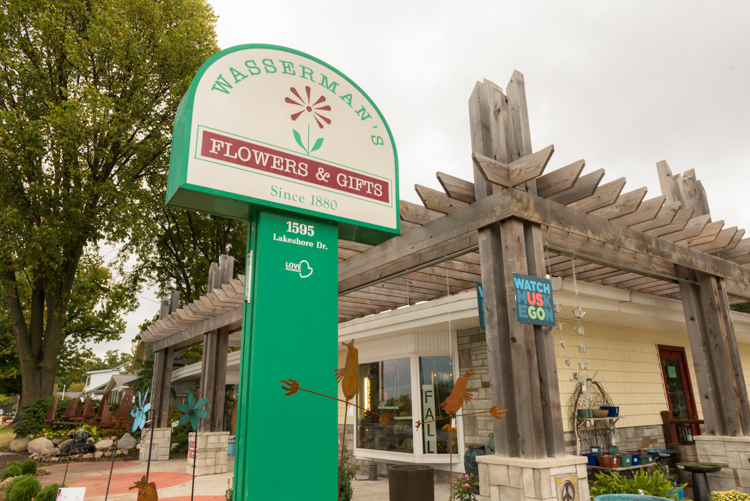
As Muskegon changes, a look to the future
Five years ago this January, Angie and Troy took over and immediately began making their own mark on Wasserman’s.
“Troy has the entrepreneurial spirit and was really excited to give it a fresh look,” Angie says as Troy’s dog, Cooper, energetically gallops into the backroom where we’re sitting. “He brought in a lot of new things: new gift lines; we had never really been into gifts and home decor and accents. He went out and found some really cool gifts. That’s one way Troy really recreated our reputation; it’s helped us reach out to younger people.”
Additionally, Troy spearheaded redoing the shop’s exterior and interior, adding a patio from where customers can see Muskegon Lake (which itself is undergoing massive change) and replacing the old carpeting with hardwood floors, among other projects. “We wanted to modernize the place and make it more fresh and inviting,” he says.
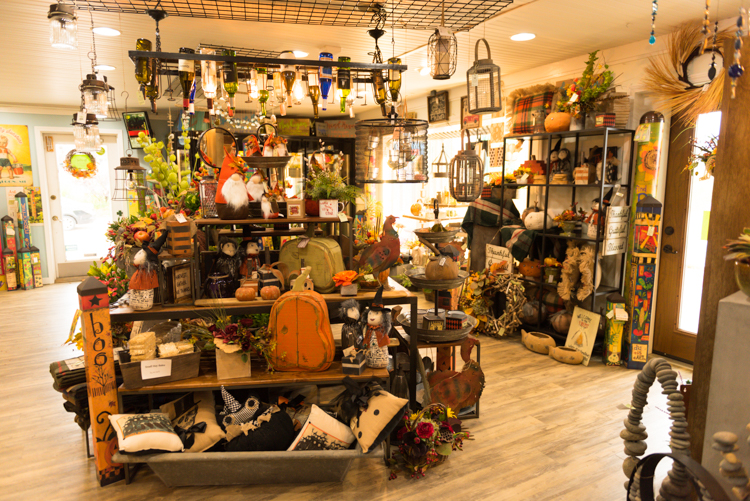
“We’ve had a great response,” Angie says of the renovations. “It’s become a shopping destination. People stop in and say, ‘I had to stop in and see what’s new.’ There’s not a ton of stores yet with destination shopping, and we wanted to be one of them. We’ve had a huge response of people loving being able to find unique gifts, things that have local flavor, like local art.”
All of this new work is indicative that Angie and Troy are planning for a lengthy future, and one that they’re hoping will benefit from an evolving city landscape. With dramatic changes planned for Muskegon’s shoreline, and specifically the shoreline along Muskegon Lake, including a major multi-use development project planned for the former Sappi paper mill site, situated just down the road from Wasserman’s, community leaders expect to see an increase in the number of residents and tourists populating the city.
“The town’s becoming way more of a touristy town,” Troy says. “There are a lot of tourists, especially in the summer months. It’s becoming a place on people’s radar to come and visit. People keep wanting the town to evolve.”
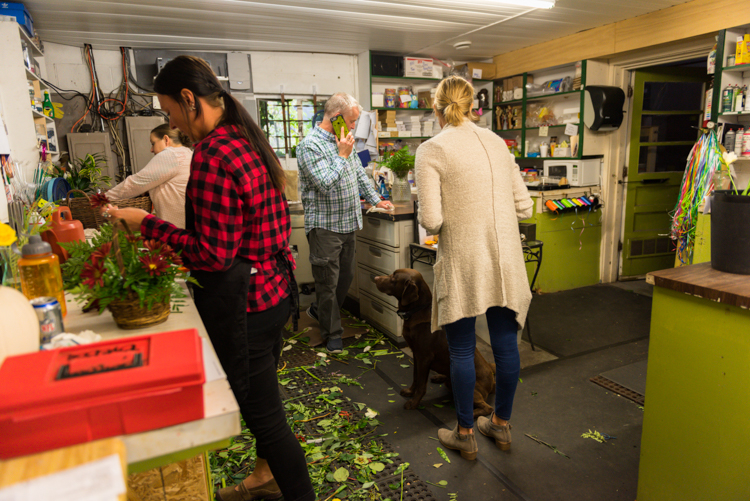
Many of the shop’s new visitors include people hopping off the Lake Express Ferry, located right by Wasserman’s at 1918 Lakeshore Dr., as well as those who are riding their bikes in the area, including along the 14-mile Muskegon Lakeshore Trail that passes by the flower shop.
While Angie and Troy are more than welcoming of their new shoppers, they are thrilled that they have longtime customers who come back year after year, decade after decade.
“A lot of small businesses are failing; people haven’t wanted to leave the house to go shopping, but there are people who still want the personalized service,” Angie says. “And you can’t easily replicate our craft. Plus, now, there’s a push for shopping local, shopping all Michigan. Everyone’s embracing anything that’s local.”

That it’s important to support a local economy is something that clearly resonates with Wasserman’s customers.
“Our industry is changing like crazy; everywhere sells flowers: Costco’s, Menards, Walmart, gas stations, online. It’s never ending,” Troy says. “They can’t offer what we offer quality- and customer service-wise, but that’s why so many little floral shops are going out of business.
“For us, customer loyalty is a reason we’re able to stay,” Troy continues. “We’ve been in business five generations. We’re working with customers who are third and fourth generation, people who have shopped with us for years and years and years. It starts with a corsage for a prom or a wedding and continues from there.”
Plus, Troy and Angie are enmeshed with their community: recently, for example, Troy modeled in Power of the Purse, the nonprofit Every Woman’s Place’s annual event that raises awareness about domestic and sexual violence. Wasserman’s provides decorations for this week’s Tempting Tables, a biennial event that benefits breast cancer research; Troy is involved in Muskegon’s Rotary Club; Angie’s on the Muskegon Lakeshore Chamber of Commerce board; the list truly seems endless.
“Part of success is being really involved in your community,” Angie says. “You have to be immersed in your community and care about where you live.”
All of this has translated to a long list of accolades, including the Michigan Floral Association naming Wasserman’s as “retailer of the year” in 2016.
“While they honor the shop’s long history, they have remained ahead of the times by keeping up with trends, modernizing their facility, and updating their products and services,” the Michigan Floral Association writes in a prepared statement. “One of their attractions is an outdoor patio where customers enjoy refreshments and a view of Lake Muskegon.”
No matter what happens in the future, Troy and Angie know they’re deeply fortunate: they live in a community they love and that loves them back. And that, they know, will always remain.
“I love being surrounded by the people here,” Angie says. “I love the natural beauty, that you can see Muskegon Lake right from the store. We always said we could never move away from the water. This is our home.”
This story is part of Rapid Growth’s “On the Ground-Muskegon Lakeshore” series, which aims to amplify the voices of the community members who make up Muskegon’s waterfront neighborhoods. Over the next three months, our journalists will be embedded in the city’s lakefront communities in order to dive deeper into topics important to residents, business owners and other members of the community. To reach the editor of this series, Anna Gustafson, please email her at AKGustaf@gmail.com, or connect with her on Facebook.
Support for this series is provided by Downtown Muskegon Now, the Muskegon Business Improvement District, the Muskegon Lakeshore Chamber of Commerce, the Michigan Economic Development Corporation, Pure Muskegon, Watch Muskegon, and the Community Foundation for Muskegon County.
Photography by Jenna Swartz; historical photos courtesy of Wasserman’s Flowers & Gifts. To connect with Jenna, visit her website and Facebook page.








